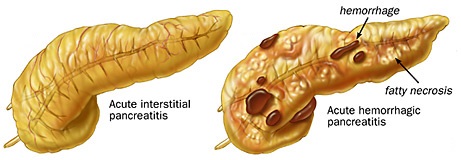- The pancreas is a long, flat gland behind the stomach in the upper abdomen. It produces digestive enzymes and hormones, which regulate how the body processes glucose, for instance.
- Pancreatitis is inflammation of the pancreas. It can either be acute, in which case short-term inflammation develops suddenly, or chronic, in which case it is reoccurring or persistent.
- The most commonTrusted Source cause of acute pancreatitis is gallstones, which can become lodged in a bile or pancreatic duct and cause inflammation. Other common causes include excessive alcohol use, genetic conditions, and the use of certain medications.

Causes
- Conditions that can lead to acute pancreatitis include:
- Gallstones
- Alcoholism
- Certain medications
- High triglyceride levels in the blood (hypertriglyceridemia)
- High calcium levels in the blood (hypercalcemia), which may be caused by an overactive parathyroid gland (hyperparathyroidism)
- Pancreatic cancer
- Abdominal surgery
- Cystic fibrosis
- Infection
- Injury to the abdomen
- Obesity
- Trauma
Symptoms
- Acute pancreatitis signs and symptoms include:
- Upper abdominal pain
- Abdominal pain that radiates to your back
- Tenderness when touching the abdomen
- Fever
- Rapid pulse
- Nausea
- Vomiting
- dark urine

